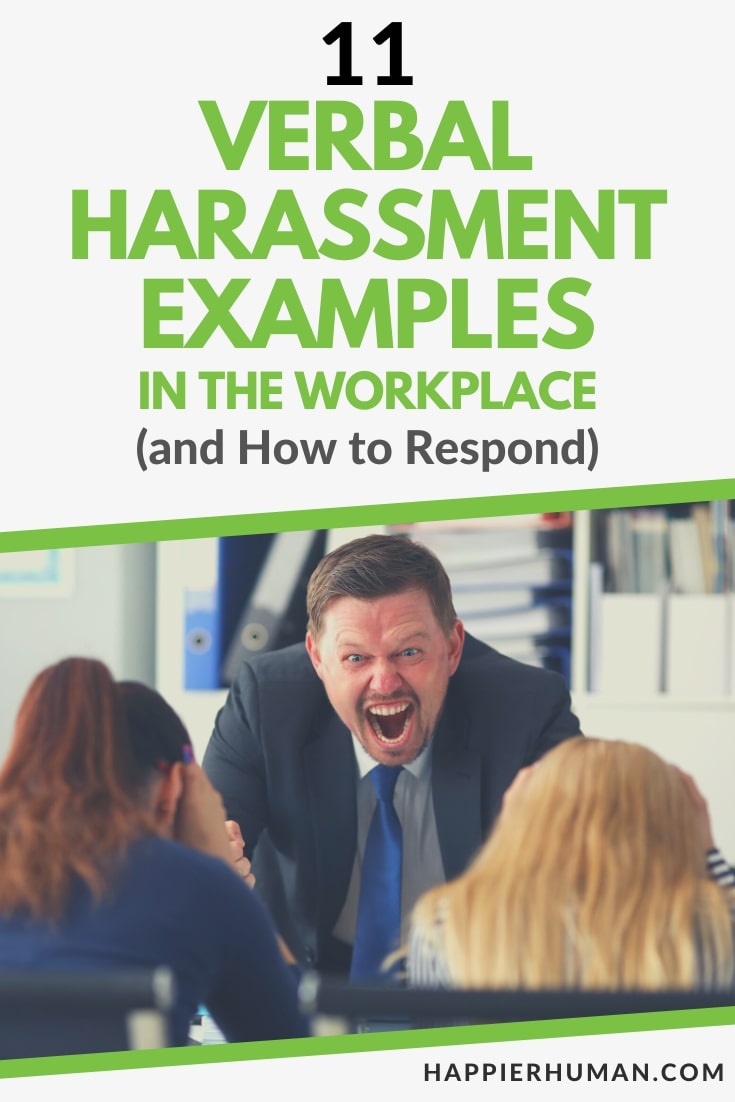It was one of the most painful moments in my life when my boss verbally harassed me at work. With one short phrase, “Perhaps you should wear revealing blouses to make more sales,” he slandered, embarrassed, and belittled me.
The insinuation was that I had no skills in my job other than using my body to sell products.
I was devastated.
Worse, how do you continue working with someone who so shamelessly harasses you? Verbal harassment examples are found everywhere, and the abuse isn’t limited to any specific gender, race, or age.
Anyone can become the aggressor, and everyone can become the victim.
But how do you know you’re the victim of verbal harassment (or the bully)? Here are some examples and an action plan to help you weather the storm of this kind of abuse.
What Is Verbal Harassment?
As kids, we are indoctrinated that “sticks and stones may break my bones, but words can never hurt me,” but the reality is that words can do a great deal more damage than physical violence. Bruises heal, but damage to your psyche doesn't always.
Verbal harassment is when someone uses words to damage your psychological well-being. After they speak to you, you are left feeling empty and negative. It’s the verbal equivalent to getting sucker punched.
What may seem like a few innocent words (and sometimes not-so-innocent words) can leave a lasting scar on your mind, which will be as limiting to your quality of life as losing a limb from being run over by a bus.
We can experience verbal harassment from anyone and in all spheres of life, including in a relationship. At home, verbal abuse is damaging because of what the person who does it to us (our partner, family member, or children) means to us.
But at work, we are placed in a delicate situation in that the aggressor is often a boss, colleague, client, or supervisor. By being forced to continue working with (or living with) the aggressor, we suffer continued psychological trauma and anxiety.
You may experience verbal harassment in many forms, from threats and insults to lies, innuendos, and criticism. It can be really tough to deal with harassment and not suffer more stress, damage to your mental health, and fatigue.
Verbal Harassment Vs Physical Harassment
If you believe that physical blows and punches do more damage than words, you are essentially trying to tell yourself that physical harassment is worse than verbal harassment.
Sadly, the two often go hand-in-hand, and both can be equally damaging. Someone may scream at you while pointing a finger at your chest or pushing you.
The bruises may heal, but the mental trauma lasts much longer. The most damaging effect of verbal harassment is the doubt it seeds in your mind.
While you know the other person is in the wrong, you end up doubting yourself. Losing self-confidence can be a one-way street to not believing in yourself.
Without raising a finger, the abuser can ruin your whole future. All it takes is some bitter words aimed at you during a moment you are vulnerable.
Nobody should have that much power over you, not even you.
The Damage of Harassment
Suffering harassment is considered unacceptable in most countries and most places of work.
The challenge is proving that someone has acted in a verbally, physically, or sexually harassing manner toward you. Not only is it a case of your word against theirs, but you may not even know you are being harassed.
It’s not like we were raised to know all the forms of harassment at work.
Oh, sure, your employer may conduct staff training about why verbal harassment is wrong, but do they show you all the different forms of verbal harassment, so you know when you are being harassed?
If you suffer abuse due to verbal harassment, it impacts your sense of self, your worth, and you begin to stress because you start to self-doubt.
The trauma of verbal harassment is a serious blow to your mental health, and you may begin to manifest physical symptoms like insomnia, diarrhea, fear responses in your body like sweats and tremors, and high blood pressure and heart palpitations.
All of these can become frequent occurrences.
Now you know how damaging verbal harassment can be, let’s look at some examples and an action plan to help you weather the storm.
11 Verbal Harassment Examples at Work
This is by no means an exhaustive list of verbal harassment examples that you may suffer at work, but these should give you a clear indication of what’s not okay behavior and what’s abusive.
1. Name-Calling
We don’t always realize that when someone calls you by a nickname, they are actually degrading you.
If you get something wrong at work, only to have a colleague call you out as being “silly,” it’s verbal harassment. Of course, it doesn’t end there.

Next, your name has changed to Stupid Sue or Dumb Dennis, whether your coworkers daringly call you this every time or behind your back.
Whether they meant to say it in a negative tone or if it was just a verbal slip is irrelevant as it’s actually verbal harassment, and when the name sticks, it continues to make you feel foolish and abused – every time you hear it.
2. Jokes at Your Expense
Perhaps one of the most insidious examples of verbal harassment is when people make a joke at work, and you are the butt of the joke. It’s inexcusable that they laugh at your expense.
Worse, when you speak up, you are often told off for being “too serious” or “not being a team player,” which means they invalidate your feelings, behavior typical of a narcissist.
3. Mocking You
It’s everybody’s right to speak up about things that bother them at work. But when you do so and get mocked for it by colleagues or your boss (oh, look, she’s being Miss Sensitive again), it’s verbal harassment. By mocking you, they bully you into silence.
This mocking behavior can even include snorting when you speak, rolling their eyes each time you make a suggestion, or any other sounds that are aimed at making you feel nervous and anxious.
4. Yelling or Raised Voices
People get worked up in the heat of a discussion, but if your boss or colleague yells at you without any reasonable cause or raises their voice, it’s verbal harassment.
They can’t win the discussion by speaking normally, so they revert to primitive instincts to use volume and tone of voice to silence (or growl) you into compliance.
5. Innuendos
My boss’s comment that I should wear revealing clothes to work as I would then meet sales targets was a clear innuendo.
He didn’t come out and say that I only had value for my boobs, but it was hinted at. An innuendo is one of those cases where the perpetrator will deny ever meaning something negative, but their thinly veiled suggestions are quite clear.
6. Threats
A boss can threaten you with unjust disciplinary action (I’ll fire you for speaking up) or threaten you in physical or sexual terms (Don’t make me come there and slap you), and these are always unacceptable forms of verbal harassment.
Nobody should feel scared at work. It’s your place of employment, not a war zone, and you shouldn’t feel unsafe with your employer or your colleagues.
Some other threats may include being told you’ll never get promoted, that your salary will be held back, or that you are unlikable at work. The list goes on. A threat is when your basic relationship non-negotiables are disregarded and you feel anxious as a result.
7. Straight up Insults
In most countries, it’s against the law to verbally insult someone, swear at them, or otherwise harm their mental welfare.
If your work environment is filled with people insulting you (calling you fat, lazy, cheap, or inept) or insulting your work (she’s just the tea girl, what does she know?), you are being verbally harassed.
You have the right to dignity, and people shouldn’t be allowed to insult you in a way that reduces your dignity.
8. Gaslighting (Usually by a Superior)
Being gaslighted at work is when someone in a position of power promises you something (usually to get you to do something for them, like that last-minute presentation), but they then pretend you misunderstood or are making things up when that promise never materializes.
You end up doubting yourself, wondering if you were dreaming or if you’ve gone mad.

I had an employer do just this. He promised me a promotion post, and I worked a year to learn the ropes, only to have someone else get the job, with my employer embarrassing me at a meeting by saying that I didn’t even qualify for the post (in front of a bunch of colleagues).
I felt ashamed and like I was a crazy person.
9. Verbal Bullying
Bullying is a broad category, and it usually includes lies, rumors, name-calling, and more. What is clear is that at work, the bully will intentionally pick on you.
No matter what happens, they are ready to bring out the worst in a situation with snide remarks, hateful comments, and derogatory statements.
You feel like they are playing darts, and your head (and heart) is the target.
10. Sexual Advances
Anyone who’s been the victim of unwelcome sexual advances will tell you how frustrating and confusing it can be, not to mention scary.
Having a colleague, client, or boss make a move on you, hint at promotions in exchange for sexual favors, and constantly tell you how sexy you are can be mentally draining, overwhelming, and psychologically damaging.
Nobody has the right to make you feel uncomfortable in your body or suggest you should use your body to earn favor. It’s basically calling you a prostitute if the suggestion is that sex can be used as currency for promotion.
11. Hypercritical Comments
Criticism isn’t necessarily a bad thing, but when someone who is in a position of authority (above your position) goes to excess in judging you, it can be seen as verbal harassment.
Imagine having a boss who intentionally creates situations where you will fail, only to call you out on it (usually in front of the entire staff) so they can embarrass you and make you feel inept.
The goal with criticism is to be constructive and encourage learning, but negative criticism is aimed at breaking someone down and making them feel incompetent – imagine the mental health trauma this causes.
Verbal Harassment Response Action Plan
As with all types of abuse, it’s essential to have an action plan in place, whether you are the employer or the employee.
Knowing what to do when you are totally bowled over by someone’s verbal harassment will help you keep your side of things clean and manage the situation effectively with as little damage to you (or the victim, if it’s not you) as possible.
Verbal harassment can often happen unintentionally, and sadly, we’re not always the most emotionally self-aware beings. When we are stressed or under group pressure, we may say or do something that is actually inexcusable.
Use your workplace action plan to help educate people about verbal harassment and ensure there are fewer instances.
This is an example of a workplace verbal harassment response action plan. You can also use some of these steps to help protect yourself from being the victim of verbal harassment at work.
Identify Verbal Harassment
If someone swears at you or calls you rude names in public, you will likely know they are verbally harassing you.
But this is not the only form of verbal harassment. Become sensitive to the innuendos, bullying, sexual advances, criticism, threats, mocking, and tone of voice that are examples of verbal harassment.

A good measure of whether something that was said to you was verbally abusive is how you feel as a result.
Do you feel mortified, depressed, angry, anxious, and ashamed? The mental effect of the abuser’s words is what tells you whether you were abused and if you should act.
Setting Your Boundaries on Verbal Harassment and Abuse
Each of us has different tolerances. You decide what you will accept from someone in your workplace.
Whether that person is a colleague, superior, or boss, you decide if you are comfortable with a raised voice, name-calling, mocking, or other forms of verbal harassment.
Ultimately, it comes down to whether you are willing to let someone sling verbal mud at you or if you will put up walls or boundaries to keep that behavior away from you.
Your sense of worth determines what your boundaries or bottom lines are. When these are crossed, you have to act or you will be letting yourself down.
Decide Whether It’s Intentional or Unintentional Harassment
Not everyone is born with a fine-tuned radar of how people feel. As a result, you may suffer verbal harassment from someone who didn’t mean it that way. They may truly not have intended to hurt you.
The catch is identifying whether the person harassed you unintentionally or if they were malicious and are now hiding behind “I didn’t mean it that way” excuses.
You have to weigh up the situation, their actions and reactions, and how you feel because of the harassment before you decide their actions were intentional or just a mistake.
Don’t React to the Abuse (Instead, Act)
Reacting is never a good idea. When you react to a situation, you give your personal power to the person abusing you. They get to pull your strings, and you never regain power.
Instead, choose to breathe, think, and decide what to do. Never lash out, scream, or engage in verbal abuse as a counter-attack. You don’t want to get caught in a situation where you’d be accused of being the pot calling the kettle black.
If you realize the harassment was truly not intentional, you can act by speaking out. Inform the abuser their words were uncalled for, rude, and caused you mental harm.
Use it as a teachable moment, where you can show them the impact of their actions, and urge them to think before they act in future.
Of course, not everyone is going to take this lesson well. Even those who harass you without meaning to will instinctively try to deny it, so it’s recommended you speak to them in private and not in front of a crowd (if you feel safe doing so).
If you sense they will not see things your way, you need to stick to the plan and not directly engage with them.
Record Evidence of the Harassment
Evidence speaks for you. If you can record meetings or conversations (as long as this is not illegal in your state), and perhaps even ask a colleague to write down what was said (as an independent third party), you can start objectively documenting the abuse.
It’s important to have evidence of the verbal harassment to help make your case should there be disciplinary action against the abuser.
Keeping a journal so you know how often you suffer verbal harassment, what times of day, and whether it’s targeted at you or if other colleagues also suffer can help you manage any gaslighting, which may make you doubt your experiences.
Evaluate and Decide on a Way Forward
Now, find quiet time, read through your notes, listen to your evidence, and carefully consider the actions of your abuser and your own actions.
Is this verbal harassment worthy of being addressed? If yes, how will you address it, and with whom?
Should you speak to the abuser or to a supervisor or someone higher up in the food chain at work?
Plan your actions, have your evidence ready, and consider that speaking up may not always be welcomed (so you need to know whether putting your foot down is worth it to you).
Many workplaces have a standard abuse guideline or policy, which will tell you exactly what the steps to outing an abuser are, whom to contact, and what will be expected of you.
Try not to get emotional (even though the harassment hurts you) when you discuss it with anyone.
Safe Statements to Use When Discussing the Verbal Harassment
While you need to step up and stick up for yourself, you should avoid launching accusations.

Telling someone they’re a bully and you’re sick of their abuse may make you feel better, but it won’t achieve anything.
Try these safe statements instead:
- “What you said to me hurts me.”
- “Your choice of words were disrespectful to me.”
- “I know that you may believe your comment to be innocent, but it is hurtful.”
- “Based on your comments, I feel I have been needlessly criticized.”
- “The way you talk to me is shameful to me, and I am worthy of better.”
If you fear the verbal harassment may become physical (especially if there have been sexually inappropriate innuendos spoken to you), you should choose your time to speak out.
Have someone with you, and avoid being pushed into an isolated spot, where it can be dangerous to face the person who’s been harassing you. Always look for ways to de-escalate the issues; never fan the flames and risk the abuser turning verbal harassment into physical abuse.
Final Thoughts on Verbal Harassment Examples
Verbal harassment examples are found in all spheres of life. Usually, you can choose to walk out of a room when someone harasses you, but if it’s your colleague or boss, it’s much harder to limit interaction.
In extreme cases, you may have to look for a different job to remove yourself from the toxicity of being harassed.
The mental trauma of being harassed and having verbal slurs thrown your way all add up over time, and you can suffer permanent damage due to the verbal harassment.
It’s far better to make a decision about whether you will stay in the target zone or step up for a better life for yourself. Keeping a future self journal can help you plan for life without the verbal harassment that’s been holding you back.
And if you want more posts about abuse and harassment, check out these blog posts:
- 20 Manipulation Tactics Used by Gaslighters, Narcissists & Sociopaths
- 5 Stages of Healing & Recovery After Narcissistic Abuse
- Reactive Abuse: Definition, Causes, Symptoms and How to Deal with It


